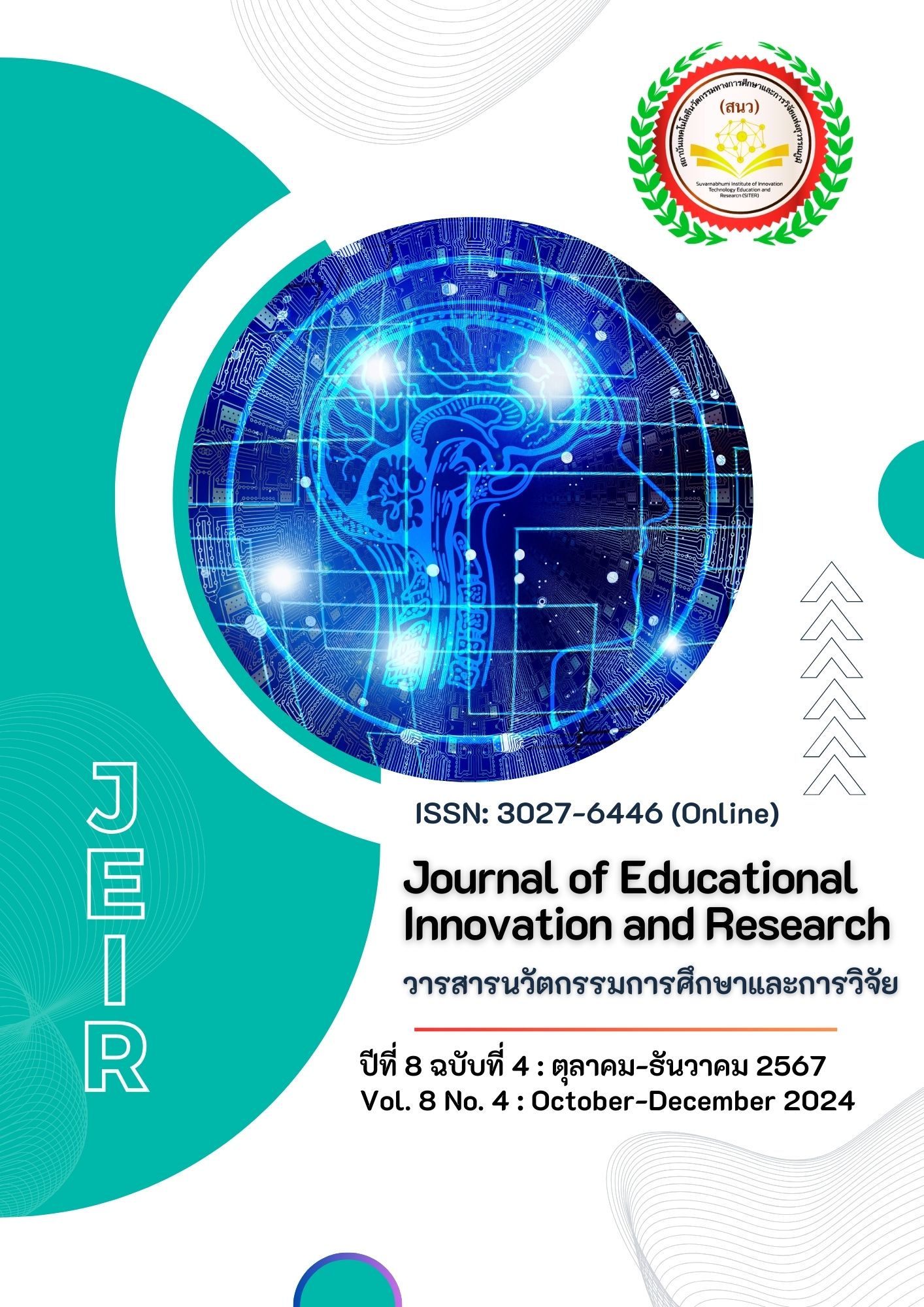An Analysis of Course Factor Correlation Causing Undergraduate Student Withdrawals Using the Apriori Algorithm and Data Mining Methods; Department of Civil Engineering, School of Engineering, King Mongkut’s Institute of Technology Ladkrabang (KMITL)
Main Article Content
บทคัดย่อ
This research employing a quantitative approach, aimed to investigate correlation between course variable factors and students’ status of being terminated of King Mongkut’s Institute of Technology Ladkrabang (KMITL) using Association Rules, Data Mining, and Apriori Algorithm. The sample were 90 Civil Engineering students of KMILT who were active from academic year 2007 to 2020. The research revealed that there was a significant factors of termination status within different groups of courses that the students enrolled. For 63.33% of first and second year students, failing (F) or obtaining low grades (D and D+) in fundamental science courses were consequently a cause of termination status. For 10% of third year students (a degree continuation of study from diploma certificate), failing or obtaining low grades in fundamental science were also a cause of termination status. For 26.67% of fourth year students, failing or obtaining low grades in specific engineering mandatory courses were consequently a cause of termination status.
Article Details

อนุญาตภายใต้เงื่อนไข Creative Commons Attribution-NonCommercial-NoDerivatives 4.0 International License.
เอกสารอ้างอิง
Al-Qudah, M. A. (2013). Predicting student retention in higher education using decision tree model. Journal of Education and Practice, 4(12), 113-120.
Anderson, L. (2011). A study of the impact of course subjects on student achievement. Journal of Student Affairs Research and Practice, 56(4), 456-464. https://doi.org/10.1109/JSARP.2011.124540
Brown, A. (2007). An analysis of the relationship between course performance and student retention. Journal of Student Affairs Research and Practice, 45(2), 156-162. https://doi.org/10.1109/ JSARP.2007.122536
Chen, A. (2020). Data mining for early intervention in student retention. Journal of Educational Technology, 48(4), 356-374. https://doi.org/10.1109/JET.2020.988204
Chen, X., Wang, L., & Zhao, Z. (2021). Correlation analysis of course factors for undergraduate students' retirement using Apriori algorithm. In 2021 IEEE 3rd International Conference on Education and E-Learning (ICEEL) (pp. 39-44). https://doi.org/10.1109/ICEEL53222.2021.9468894
Davis, M. (2016). An evaluation of the impact of course difficulty on student performance. Journal of College Student Development, 66(5), 567-576. https://doi.org/10.1109/JCSD.2016.124545
Davis, R. (2008). An investigation into the impact of course difficulty on student success. Journal of Student Affairs Research and Practice, 49(3), 276-282. https://doi.org/10.1109/JSARP. 2008.124537
Green, K. (2012). An evaluation of the relationship between course difficulty and student success. Journal of Higher Education, 58(3), 356-365. https://doi.org/10.1109/JHE.2012.124541
Hu, J., Li, J. & Gao, Y. (2021). Association rule mining of course factors for predicting undergraduate students' retirement using Apriori algorithm. In 2021 IEEE International Conference on Computational Intelligence and Virtual Environments for Measurement Systems and Applications (CIVEMSA) (pp. 1-6). https://doi.org/10.1109/CIVEMSA51814.2021.9487873
Huang, Z., Yang, Y. & Chen, C. (2021). Analysis of factors influencing undergraduate students' retirement based on Apriori algorithm. In 2021 International Conference on Computational Intelligence and Information Technology (CIIT) (pp. 60-65). https://doi.org/10.1109/CIIT52753. 2021.00017
Jang, J. S. (2010). Predicting student retention using data mining techniques. Journal of Educational Technology Development and Exchange, 3(1), 1-12.
Johnson, B. (2014). A review of the literature on the relationship between course difficulty and student success. Journal of Student Affairs Research and Practice, 62(4), 456-464. https://doi.org/ 10.1109/JSARP.2014.124543
Johnson, M. (2007). The influence of course difficulty on student performance and retention. Journal of College Student Development, 48(5), 567-576. https://doi.org/10.1109/JCSD.2007.124536
Kim, T. (2013). An analysis of the impact of course subjects on student performance. Journal of College Student Development, 60(5), 567-576. https://doi.org/10.1109/JCSD.2013.124542.
Lee, R. (2015). An examination of the relationship between course subjects and student achievement. Journal of Higher Education, 64(3), 356-365. https://doi.org/10.1109/JHE.2015.124544
Lee, S. (2010). An examination of the relationship between course difficulty and student performance. Journal of College Student Development, 52(5), 567-575. https://doi.org/10.1109/JCSD.2010.124539
Li, Q., Cui, C. & Xu, H. (2021). A study on the correlation between course factors and undergraduate students' retirement using Apriori algorithm. In 2021 11th International Conference on Electronics, Communications and Networks (CECNet) (pp. 1-4). https://doi.org/10.1109/CECNET52396. 2021.9463231
Li, Y., Zhang, X. & Wang, C. (2021). Mining course factors of undergraduate students' retirement behavior based on Apriori algorithm. In 2021 2nd International Conference on Intelligent Information Processing (ICIIP) (pp. 348-353). https://doi.org/10.1109/ICIIP53195.2021.9442755
Liu, L. (2021). Association rule mining for early warning of student at-risk in higher education. Journal of Higher Education, 91(1), 123-145. https://doi.org/10.1109/JHE.2021.988301
Smith, J. (2005). The impact of course subjects on student retention. Journal of Higher Education, 45(3), 212-219. https://doi.org/10.1109/JHE.2005.132457
Tan, S. K. (2011). An analysis of student retention factors in higher education using data mining techniques. Journal of Educational Technology Development and Exchange, 4(1), 1-12.
Wang, W., Liu, J. & Zhang, H. (2021). Analysis of course factors correlation for undergraduate students' retirement using Apriori algorithm. In 2021 IEEE International Conference on Education and E-Learning (ICEEL) (pp. 1-6). https://doi.org/10.1109/ICEEL53354.2021.9507348
Wilson, J. (2019). Predicting student retention using machine learning. Journal of Higher Education, 89(6), 789-805. https://doi.org/10.1109/JHE.2019.988102
Wilson, P. (2009). A review of the literature on the relationship between course subjects and student success. Journal of Higher Education, 51(4), 356-364. https://doi.org/10.1109/JHE.2009.124538
Zhao, M., Zhang, H., & Gao, X. (2021). Application of Apriori algorithm in analysis of course factors correlation for undergraduate students' retirement. In 2021 IEEE 5th International Conference on Social Networks Analysis, Management and Security (SNAMS) (pp. 1-6). https://doi.org/10.1109/SNAMS53235.2021.9558706


